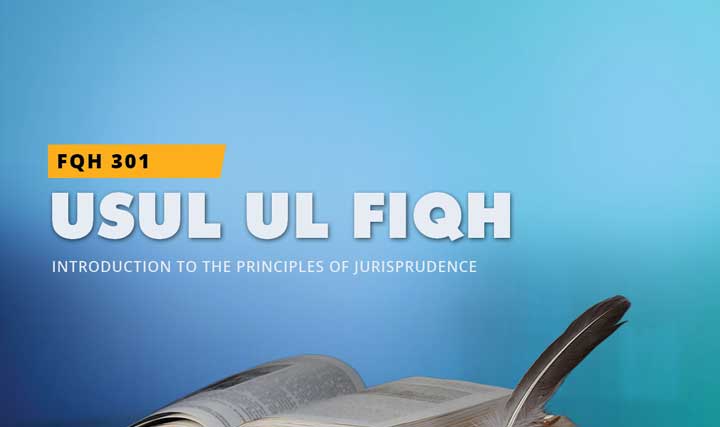Usul ul Fiqh – Principles of Jurisprudence
Introduction to the Course
Usul ul Fiqh is the science of understanding the principles behind how scholars derive rulings from the Quran and Sunnah, e.g., halal and haram. Why do some scholars look at the same set of evidences and come to different conclusions. How come some scholars give preference to certain verses or ahadith over others. Why does one Imam have a different set of parameters than the other? Can I, an average Muslim, simply pick and choose any opinion? Or, should I stick to one madhab? These questions and more are addressed in this very comprehensive course. The main course text will be Ta’heel al Fiqhi (Section in Usul ul Fiqh) by Shaykh Amir Bahjat (a contemporary Hanbali scholar) and complimented with readings from Al-Waraqaat (a Shafi’ee text authored by the great Imam al-Haramain al-Juwayni).
For this course, the following topics are covered:
Lesson 1 – Introduction
- Aims & Objectives
- Introduction to the Texts
- Definition of Usul al-Fiqh
- Three Focus Points
- Benefits of its study
- Imam al-Shafi and his work al-Risalah
- Ruling of its study
- Schools of Usul al-Fiqh (Methodologies)
- Difference between Usul al-Fiqh, Fiqh and Fiqh Maxims
- Revision Q & A
Lesson 2 – Types of Rulings
- Hukm Taklifi
- Fard/wajib (Obligatory)
- Mandub (Recommended)
- Haram (Prohibited)
- Makruh (Disliked)
- Mubah (Permissibile)
- Hukm Wad’i:
- Sabab (Reason)
- Shart (Condition)
- Mani’ (Impediment)
- Valid and Invalid
- Default and Concession
- Classification of Obligatory
Lesson 3 – Sources of the Shariah
- Evidences of the Shariah
- Agreed Upon Evidences and Disagreed Upon Evidences
- Textual Evidences and Rational Evidences
- The Noble Quran
- Introduction and Overview of the Quran
- Dalalah of the Verses (Explicit and Non-Explicit Verses)
- Qira’ah al-Shadhah (Solitary Narrated Verses)
- The Prophetic Sunnah
- Definition of the Sunnah
- Classifying the Actions of the Prophet (saw)
- Authority of the Sunnah
- Narrations in relation to how it has reached us (Mutawaatir and Ahad Narrations)
Lesson 4 – Naskh and Ijma
- Naskh – Abrogation
- What is Naskh?
- What is the wisdom behind it?
- How many verses have been abrogated?
- What are the conditions of abrogation?
- How do we know abrogation has occurred?
- What are the types of abrogation?
- Ijma – Consensus
- What’s the definition of Ijma?
- Is Ijma possible?
- Proofs for Ijma
- Types of Ijma
Lesson 5 – Function of the Words
- Classification in terms of clarity
- Classification in terms of stated (mantuq) or implicit/understood (mafhum)
- Types of mafhum
Lesson 6 – Implication of the Words
- The Dhahir (manifest/dominant)
- The Command
- The Prohibited
- The General (aam)
- The Specific (khas)
- The Absolute (mutlaq)
- The Restricted/qualified (muqayyid)
Lesson 7 – Qiyas
- Introduction
- Definition
- Types of Qiyas
- Pillars of Qiyas & their Conditions
- Identifying the Illah/Ratio Legis
- Is Qiyas a proof?
Lesson 8 – Differed Upon Evidences Part 1
- Opinion of a Sahabi
- Previous Shariahs
Lesson 9 – Differed Upon Evidences Part 2
- Maslahah Mursalah/Public Interest
- Istihsan/Juristic Preference
- Istishab/Presumption of Continuity
Lesson 10 – Maliki Specific Principles
- Amal Ahl al-Madinah/Actions of the People of Madinah
- Sadd al-Zaraai’/Blocking the means
- U’rf/Custom & norms of the society
- Mura’at al-Khilaf/Consideration of the differences
Lesson 11 – Ijtihad vs. Taqlid
- Introduction to Ijtihad, Taqlid, Madhabs & Talfiq
- Arena of Ijtihad
- Who is a Mujtahid?
- Ruling of Ijtihad
- Divisibility/Fragmentation of Ijtihad
- Is every Mujtahid correct?
- Can one change their Ijtihad?
- Taqlid and its ruling in Fiqh
- Following a Madhab
- Talfiq & its types
Lesson 12 – Reconciliation of the Evidences
- Conflict & its resolution
- Reasons for Tarjih
- Overview of material covered
Objectives of the course:
- To understand and appreciate the depth our tradition has in preserving the Deen
- To understand why and how different rulings are derived
- To understand the intricacies of accurately deriving a fiqh rule
- To appreciate the scholars and their efforts in deriving the rules from the Quran and Sunnah
- To appreciate why scholars differed in their reasoning and understanding the evidences
- To respect and tolerate differences of opinion.
Course Content
Lesson 1 : Lesson 1-12
-
Lesson 1 - Introduction
-
Lesson 2 - Types of Rulings
-
Lesson 3 - Sources of Shariah Part 1
-
Lesson 4 - Sources of Shariah Part 2
-
Lesson 5 - Function of the Words
-
Lesson 6 - Implication of the Words
-
Lesson 7 - Qiyas
-
Lesson 8 - Statements of the Sahabah
-
Lesson 9 - Maslaha al Mursala
-
Lesson 10 - Maliki Specific Principles
-
Lesson 11 - Ijtihad vs. Taqlid
-
Lesson 12 - Reconciliation of Evidences & Conclusion
- Lesson 1 - Introduction
- Lesson 2 - Types of Rulings
- Lesson 3 - Sources of Shariah Part 1
- Lesson 4 - Sources of Shariah Part 2
- Lesson 5 - Function of the Words
- Lesson 6 - Implication of the Words
- Lesson 7 - Qiyas
- Lesson 8 - Statements of the Sahabah
- Lesson 9 - Maslaha al Mursala
- Lesson 10 - Maliki Specific Principles
- Lesson 11 - Ijtihad vs. Taqlid
- Lesson 12 - Reconciliation of Evidences & Conclusion

